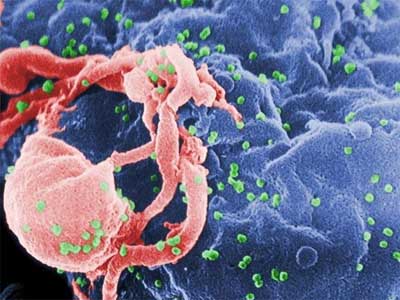- Home
- Editorial
- News
- Practice Guidelines
- Anesthesiology Guidelines
- Cancer Guidelines
- Cardiac Sciences Guidelines
- Critical Care Guidelines
- Dentistry Guidelines
- Dermatology Guidelines
- Diabetes and Endo Guidelines
- Diagnostics Guidelines
- ENT Guidelines
- Featured Practice Guidelines
- Gastroenterology Guidelines
- Geriatrics Guidelines
- Medicine Guidelines
- Nephrology Guidelines
- Neurosciences Guidelines
- Obs and Gynae Guidelines
- Ophthalmology Guidelines
- Orthopaedics Guidelines
- Paediatrics Guidelines
- Psychiatry Guidelines
- Pulmonology Guidelines
- Radiology Guidelines
- Surgery Guidelines
- Urology Guidelines
Early antiretroviral therapy may lead to bone loss in patients with HIV

Washington D.C. [USA]: A recent study has found that early antiretroviral treatment (ART) at the time of diagnosis may lead greater bone loss compared with deferring ART.
The study followed 399 participants (195 immediate ART and 204 deferred ART) for an average of 2.2 years.
Although the study revealed a negative effect on bone density of immediate ART, the overall benefits of ART for preventing HIV transmission and adverse health outcomes prevail.
It will be important to understand the long-term consequences of reductions in bone mineral density associated with ART and whether these reductions continue or stabilise with longer therapy.
Prof. Jennifer Hoy, lead author of the Journal of Bone and Mineral Research, said, "What we found was that starting treatment is also associated with accelerated bone loss of about 2-4%, and the rate of decline then appears to slow after the first 2 years of treatment, compared with HIV positive people who deferred treatment."
Adding, "We have no cure for HIV, so antiretroviral treatment is for life. An increased rate of bone loss may become important years later, in the setting of increased risk of fragility fracture."
The study was published in Journal of Bone and Mineral Research.

Disclaimer: This site is primarily intended for healthcare professionals. Any content/information on this website does not replace the advice of medical and/or health professionals and should not be construed as medical/diagnostic advice/endorsement or prescription. Use of this site is subject to our terms of use, privacy policy, advertisement policy. © 2020 Minerva Medical Treatment Pvt Ltd